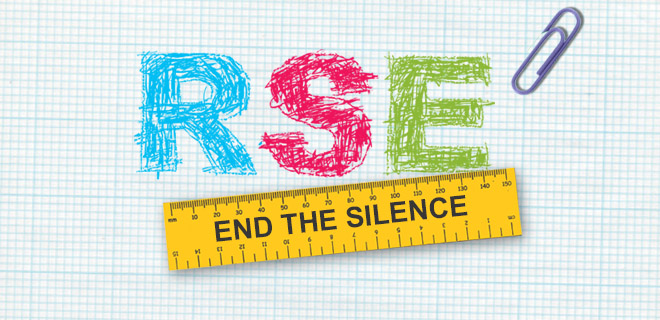
After an almost 40-year-long campaign by Terrence Higgins Trust and our partners, in March 2019, MPs finally backed plans for compulsory, LGBT-inclusive Relationships and Sex Education lessons.
How did we get here?
In 2016 we surveyed almost 1,000 young people which culminated in a report on LGBT-inclusive RSE published in 2017, which you can download below.
Young people want RSE but they aren’t always getting it. Our research showed that one in seven did not receive any RSE in school at all.
In England, RSE is due to become compulsory in all secondary schools from September 2020, with relationships education compulsory in all primary schools.
In Wales, RSE will be a statutory part of the new curriculum, which is being developed and due to be in place across Wales by 2022. For learners under the current curriculum, there is now enhanced provision, with work ongoing to identify learning needs and refresh existing guidance.
In Scotland, RSE is taught through Relationships, Sexual Health and Parenthood Education (RSHP) but is not compulsory.
RSE in England
We believe all young people have the right to access high quality, age-appropriate and inclusive RSE in all schools.
Following the passing of the Children and Social Work Act 2017, all secondary schools in England will be required to teach RSE and primary schools to teach relationships education as of September 2020. There was a delay of 12 months from the initial implementation date of 2019.
In July 2018, the Department for Education published updated draft guidance for RSE lessons alongside a consultation that closed in November 2018. There were 40,000 responses to that consultation, including our own, where we welcomed compulsory RSE and RE but highlighted our concerns with the Government’s proposals.
In March 2019, the House of Commons voted overwhelmingly in support of replacing existing RSE guidance and regulations from the year 2000 that is still used in schools. The House of Lords confirmed this vote and in April 2019 the final hurdle was over and RSE will become mandatory in all schools from September 2020.
This means all primary schools in England will be required to teach Relationships Education, all secondary schools in England will be required to teach RSE, and all schools in England will be required to teach Health Education (HE).
The Government continues to recommend that primary schools deliver sex education, although this is not compulsory.
All schools will be required to teach in accordance with the new guidance and regulations for these subjects. The new guidance is the first to be published since its predecessor in 2000.
Schools will also be required to have an up-to-date policy statement for teaching RE/RSE that is available to parents and carers.
On sexual health, the guidance suggests that each pupil should know the following before they leave school:
- How sexually transmitted infections (STIs), including HIV, are transmitted.
- How the risk of transmission can be reduced through safer sex (including through condom use).
- The importance of and facts about testing for STIs.
- The prevalence of some STIs, the impact they can have on those who contract them and key facts about treatment.
Our key asks for the Government:
- Invest sufficient funding for training, resources and support to ensure that inclusive RSE is taught to a high standard in all schools.
- Commit to ensuring that every school has access to quality-assured, inclusive teaching materials.
- Ensure that OFSTED have a meaningful role in monitoring how these subjects are taught.
- Require and support schools to find time in the timetable to deliver these lessons.
- Require schools to link up with local authorities and local providers to enable teaching of sexual health and HIV to be informed by local health priorities and point to local services.
RSE in Wales
In December 2017 an expert panel established by the Welsh Government published its report The Future of the Sex and Relationships Education Curriculum in Wales.
The report contained 11 recommendations, including that SRE be made a statutory part of the new curriculum for all primary and secondary schools in Wales under the revised name of Sexuality and Relationships Education, and specialised SRE teacher training to be introduced with clear career progression routes.
The findings of the SRE expert panel’s report reflected many of our concerns about the content and delivery of RSE to date: it has historically been inconsistent, heteronormative and often negative, with little reference to matters around consent, pleasure, and the positive aspects of sex and relationships.
RSE has also had a low status and priority in schools, resulting in poor training and support for teachers and a lack of resources for the subject overall.
In May 2018, the Cabinet Secretary for Education announced that she would be accepting all the recommendations of the review. SRE would become Relationships and Sexuality Education (RSE) in advance of the new curriculum being rolled out nationally in 2022, with updated guidance issued for schools.
The revised guidance was issued for consultation in February 2019. While the emphasis on inclusivity was welcome, we were disappointed by the lack of detail about what children and young people were expected to learn at each age/developmental stage.
There was also no indication of what the RSE curriculum should actually cover. While we appreciate the Welsh Government’s ambition for a less prescriptive approach to the new curriculum, we are absolutely clear that this is not appropriate for RSE at this stage.
Provision has been so patchy and the lack of professional training and initial teacher education in RSE means that we simply do not have the same established body of expertise and high quality resources that other subjects enjoy.
In January 2020, the Education Minister confirmed that, under the new curriculum, there would be no right for parents and carers to remove their children from RSE lessons. This is another big step forward and we commend the Minister for taking this action. Ensuring that all children and young people are able to receive clear, objective, age-appropriate information is essential to help them form healthy relationships, understand their bodies and to protect their sexual health throughout their adult lives.
We'll continue to work with the Welsh Government and third sector partners as the process of developing new RSE guidance and curriculum content progresses.

